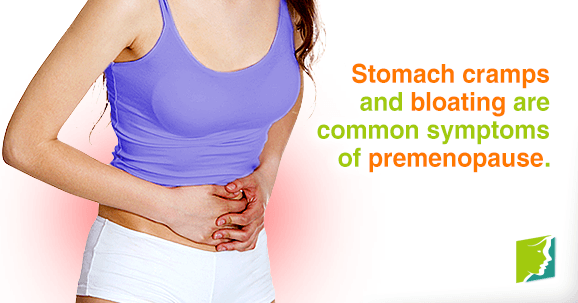Premenopause spans the main female reproductive years. It begins when you start your first period and finishes when you begin seeing the signs of menopause. These are the years of fertility. The hormones that control this reproductive cycle fluctuate depending on where you are in your menstrual cycle, and these hormones can also have other physical and psychological effects on your body. You may experience premenopausal symptoms, commonly known as premenstrual syndrome (PMS), which generally occur during the time before your period. Read on to discover more about the symptoms of premenopause.
What Are the Symptoms?
Symptoms can range from mild to severe, and each woman will have a different experience. Some will have the same symptoms every month, but varying in intensity, or some women might experience completely different symptoms from month to month. There are many symptoms that a woman might experience during premenopause that can be both physical and psychological in nature. It is important for each woman to be aware of her own patterns, as a radical change could be indicative of an underlying health problem. Some of the more common complaints are listed below.
Stomach Cramps
These can happen just before or during menstruation. They can range from a mild feeling of discomfort to intense and debilitating pain.
Mood Swings
Many women find they have intense and sudden changes in mood at certain times in their cycle. This could be hormone related, but could also be a consequence of lack of sleep or stress arising from other symptoms.
Food Cravings
Carbohydrate cravings are common during this time of the month and can lead to overeating and weight gain. As weight gain can cause stress and discomfort, it can often lead to other symptoms.
Depression
The reproductive cycle is controlled in part by the female sex hormone estrogen. Imbalance of this hormone can have a direct effect on mood and can cause depression. This can occur only before and during menstruation, or it can develop into clinical depression, which requires medical attention. It is important to be aware of depression and how long it lasts.
Bloating
The other main female sex hormone, progesterone, fluctuates around the time of menstruation, which encourages water retention. As a result, many women complain of monthly bloating, which can be uncomfortable and annoying.
Premenopause symptoms are common and are generally nothing to worry about. Each woman has her own cycle and experience during this stage, and these symptoms do not normally affect daily life throughout the month. However, if symptoms are severe and start affecting quality of life, it is important to seek medical advice, as there are ways of treating premenopause symptoms.
Sources
- National Health Service UK. (2013). Symptoms of premenstrual syndrome (PMS). Retrieved August 13, 2014, from http://www.nhs.uk/Conditions/Premenstrual-syndrome/Pages/Symptoms.aspx
- Office on Women's Health. (2012). Premenstrual syndrome (PMS) fact sheet. Retrieved August 13, 2014, from http://www.womenshealth.gov/publications/our-publications/fact-sheet/premenstrual-syndrome.html#f
- Women's Service and Resources. (n.d). Menstrual Cycle & PMS. Retrieved August 13, 2014, from https://wsr.byu.edu/pms


